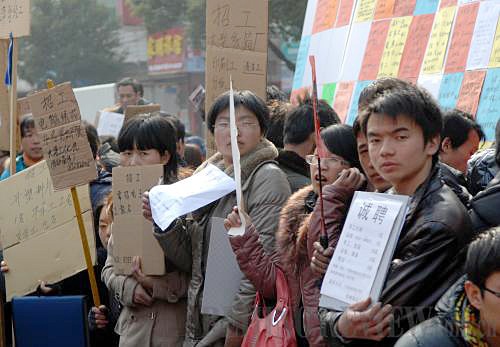|
 |
|
LABOR SHORTAGE: Head hunters, holding signs with available vacancies, wait anxiously for applicants at a recruitment center in Yiwu, Zhejiang Province, on February 12 (JU HUANZONG) |
Museum Concerns
Following the move to allow free admission to museums and memorials in 2008, China's Ministry of Culture has decided by the end of 2011 all national and provincial art museums will follow suit, together with public libraries and cultural centers. This is undoubtedly good news for the public. To ensure effective implementation of this good policy, three major things must be taken good care of: expenses, service and management.
Past experience tells once these units begin to offer free service, operation will become a problem. To avoid the tragic fate of failure, there must be special fund allocation for this cause. The free admission policy is jointly issued by the Ministry of Culture and Ministry of Finance, so the involvement of the latter may help with sufficient capital provision, but how to ensure timely and effective use of the allocation still requires attention and supervision.
In general, free admission will lead to a surging number of visitors. To receive more visitors is a good thing, but are these places still able to offer good service in face of so many visitors?
Particularly for managers, a sharp increase in visitors will present a big challenge to their capability. If they do well, then everything is OK, but if not, it's a pity for visitors who want to enjoy their tour.
Beijing Times
Pension Crisis
During this year's session of local legislature in Shanghai, pensions again became the focus of attention. In recent years, Shanghai has to input more than 10 billion yuan's ($1.5 billion) fiscal subsidies into social security programs.
The huge hole in pension and other social security fees obviously results from Shanghai's large aging population. By 2008, Shanghai already had 3 million residents above the age of 60, accounting for 21.6 percent of residents of the Shanghai hukou, which is twice the rate of the national level. Meanwhile, Shanghai's birth rate was the country's lowest, staying in negative growth for 17 years.
It is estimated that in 2050 China's elderly people will surpass 400 million, making up 30 percent of the total population. In this way, the problem facing Shanghai today will spread across the whole country by then.
In order to fill in the huge gap in capital demand, Shanghai plans to use profits from state-owned enterprises and land transfer fees. Obviously, the former is unlikely to offer too much while the latter is an unsustainable capital source. To tackle the problem, maybe it's also necessary to cut some of the government's administrative expenses and reform the present pension mode based on deficit spending.
Yangcheng Evening News
Labor Rights
The seasonal labor shortage after each Spring Festival has been a big headache for owners of manufacturing facilities nationwide. This year, the battle between factories to hire enough migrant workers in China's economically advanced eastern areas and those in the western areas has become particularly fierce. We hope that the battle could turn into a competition to offer laborers better work conditions and social security benefits they deserve.
Labor shortages are a relatively new phenomenon in China's central and western regions, which are traditional exporters of inexpensive labor resources. In recent years, industrial sectors there have been greatly stimulated by the Central Government's strategies and incentives to develop those areas.
With migrant workers being sought nationwide, their salaries have surged in recent years. The National Bureau of Statistics says migrant workers' average salaries rose by 19 percent and 16 percent respectively in 2008 and 2009. But some of the employers are still reluctant to provide them with social security benefits and other legal rights.
For example, many migrant workers need to work nearly 60 hours every week; nearly 60 percent don't have an employment contract with their employers; and only a small proportion are covered by the social safety net.
It is hoped the great demand for inexpensive labor resources will force employers to upgrade their employees' rights and benefits.
The Beijing News
Interns' Abuse
In the city of Guangzhou, Guangdong Province, a subsidiary of one of the world's top 500 companies is employing around 1,200 interns, on a scale larger than its formal employees. The interns are forced to work for more than 100 hours every week. This company has now been ordered to change the situation.
Today, enterprises cooperate with technical and vocational schools, with schools providing enterprises with a large number of interns at times of labor shortage.
After the Spring Festival, which fell on February 3 this year, China's economically developed southern provinces are widely faced with serious shortages in the workforce. For labor-intensive enterprises, interns are the most flexible and cheapest resource.
For example, in October 2010, an investigative report compiled by teachers and students from more than 20 colleges revealed Foxconn had taken advantage of a large number of student interns in several cities. Most of them were placed on assembly lines unrelated to their majors and some made to work overtime. This means the concept of cooperation between schools and enterprises, which is meant to prepare students for future work, is being abused.
Yanzhao Evening News | 